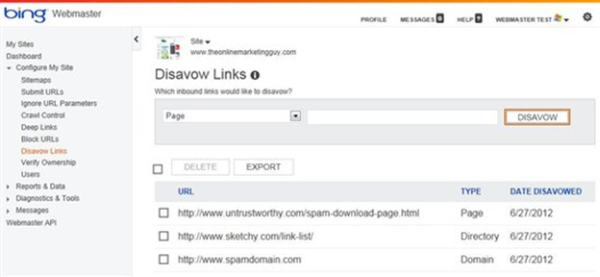
This is a guest post by Amanda DiSilvestro.
One of the biggest problems for website owners is negative SEO or competitors pointing unwanted links toward their competitions website. Unfortunately, website owners have never had much control when it comes time to fix these unwanted links. The problem is actually quite similar to something you might have dealt with in school: If your friends were starting rumors about you, you want to stand up and do something about it, right? Now imagine your teacher saying, “I’m sorry, but you can’t do anything about this. I might get to helping you when I have time.” Does that seem fair?
Bing doesn’t think so either, so as of two weeks ago Bing launched a disavow links tool to help give webmasters a little bit more control over negative SEO and unwanted links. Google and other search engines have discussed a tool like this in the past, but Bing is the first to actually put it into action.
How the Bing Disavow Links Tool Works
The Bing Disavow Links Tool is easy to use if you have a Bing Webmaster Tools account. You can sign up for one here in just a few minutes if you don’t have a login. Once you’re ready to go, you can start alterting Bing of unwanted links through the tool. The official statement from Bing said:
Today we’re announcing the Disavow Links feature in Bing Webmaster Tools. Use the Disavow Links tool to submit page, directory, or domain URLs that may contain links to your site that seem ‘unnatural’ or appear to be from spam or low quality sites. This new feature can be easily found in the Configure Your Site section of the navigation.
One of the greatest parts about the tool is just how intuitive it is. Even if you’re new to Bing Webmaster tools, finding the disavow links tool is simple if you follow the following 5 steps:
- You must be signed into your Bing account.
- You should select the website where you want to use the Disavow Links Tool.
- Click on “Configure my Site”
- Click on “Disavow Links”
- Put the URL of the website where you want to disallow the links that are pointing back to your site. Below is a screenshot taken from found.co.uk that illustrates how it works:

As you can see, Bing gives you a choice to disallow links from a page, directory, or domain. This is useful because you may not want to ban an entire site from ever linking to your site (or at least using links that count according to Google bots).
You will also notice that whatever website/page/directory that you choose to disavow the links from will be recorded on the bottom of the screen. The URL of the website as well as the type and date when you completed the disavow action will all be shown for your records. You can export this page whenever you wish and click “delete” if you ever want to undo the action you just performed.
The Bing Disavow Links Tool Red Tape
Naturally, there are a few things that website owners should know about the tool that aren’t necessarily shown on the surface:
First, it’s important to realize that the tool is really just a way to signal to Bing that they should pay attention to those links on that website. In other words, using this tool doesn’t absolutely ensure that those links will be un-counted immediately. Bing will analyze these requests and decide if the link is in fact spam, which works out well in case website owners accidentally flag a good link as a bad one.
Second, Bing’s Duane Forrester made it clear that using this tool won’t cause website owners to see a drastic change in SERP position. Backlinks are just one aspect that Bing uses to determine a ranking system on their SERPs, so although the Disavow LinksTool will help, it’s not going to make a huge difference.
Third, it’s important that website owners understand that it is truly their job to find these links that should not be counted. Bing will do its best to try and find these unnatural links through algorithms and other systems, but the search engine will not help you fill out these forms. In other words, if you’re a website owner who doesn’t want to spend time finding links or websites to disavow, this tool will be of little use.
Is the Bing Disavow Links Tool All It’s Cracked Up to Be?
Now to answer the real question that started it all: Is this tool really as great as it seems? At first glance. it seems as though there is nothing better, but some skeptics are still not so sure. Industry experts such as Vanessa Fox and Keith Horwood make a few points against the significance of the tool:
- Does Bing even penalize your site because of negative SEO?
Bing is a bit unclear when it comes to how they penalize sites with spammy links. Fox explains that a blog post and an interview seem to point toward the idea that Bing will penalize the sites that have spam links on them; not necessarily sites with spam links pointing to them. Unfortunately, this is still a bit unclear no matter how much research I do.
- It is really worth the time to try and find all of these links?
As discussed above, Bing is not giving you all of the potentially spammy links and then letting you decide which you accept and which you do not. You have to type each link in manually, and when you’re really the victim of negative SEO this is no easy feat. And for what? To maybe, possibly, help your search engine ranking a little bit?
- Should you worry about Bing if you’re worried about Google?
This is really the ultimate question. Many people put the majority of their focus on the number one search engine—Google—and leave Bing on the backburner. When Google comes out with a tool like this there will likely be many more people interested, but is the Bing version really worth all the hype if you weren’t too worried about your position there in the first place? Remember, it takes a long time to find these spammy links.
Will you use the new Bing Disavow Links Tool? Are you holding out for a tool like this from Google? Let us know what you think in the comments below.
Photo Credit: searchengineland.com
Amanda DiSilvestro gives small business and entrepreneurs SEO advice ranging from keyword density to recovering from Panda and Penguin updates. She writes for HigherVisibility SEO, a nationally recognized SEO consulting firm that offers online marketing services to a wide range of companies across the country. Connect with Higher Visibility on Google+ and Twitter to learn more!




Yes , Bing finally launches disavow links, this is a very good links. It differ with Blocking URL function. The webmaster can now be initiative to accept which links he like .
I also write an article about this: Disavow Links 与 阻止URL 的差别
( the difference with disavow links and block url ) http://www.jsxubar.info/disavow-links.html .
Thank you for this so good article. I am from China.
This sounds a good idea in theory but as mentioned is anybody actually that bothered about Bing? Some stats say that even though its smaller numbers the traffic from Bing is actually better for most websites? Either way if it pushes Google to release its own version of the tool I think that will be the main benefit of this.
Thanks for the mention Amanda! I’ve not had to use the tool once yet, but I would look at it if a client has a serious link quality problem, that’s for sure.
Is negative SEO that much of a problem that people now have to approve or disapprove links to their own sites? I can’t say that I have yet to come across a scenario where a competitor has deliberately tried to sabotage a ranking through building spammy links.